Saturday Feb 21, 2026
Saturday Feb 21, 2026
Thursday, 23 October 2025 00:21 - - {{hitsCtrl.values.hits}}
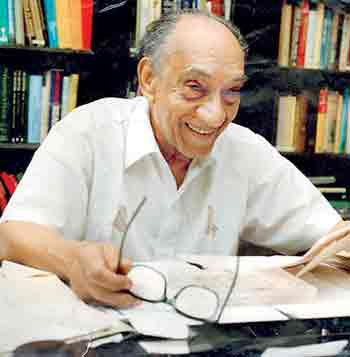
In 1977, JR promised ethnic Roundtable but convened it only in 1984
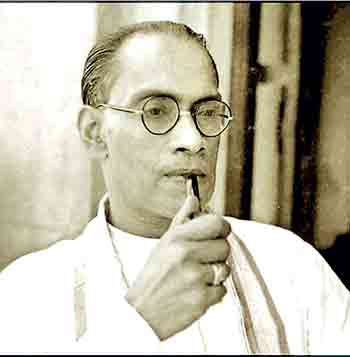
SWRD should have entered B-C Pact immediately after Sinhala Only in 1956
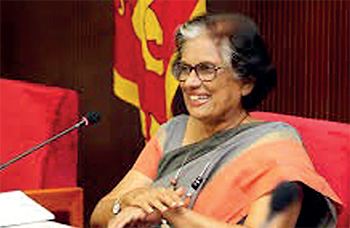
Chandrika should have implemented B-C Pact or 13A in her first year
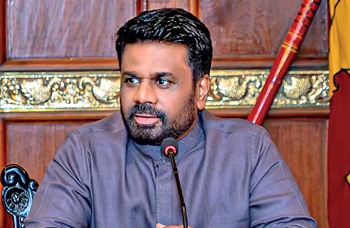
When will AKD hold PC elections?
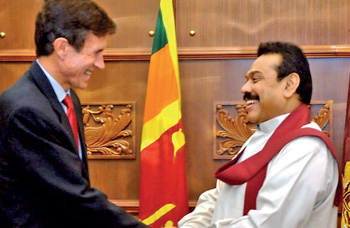
US Ambassador Robert Blake and President Mahinda Rajapaksa
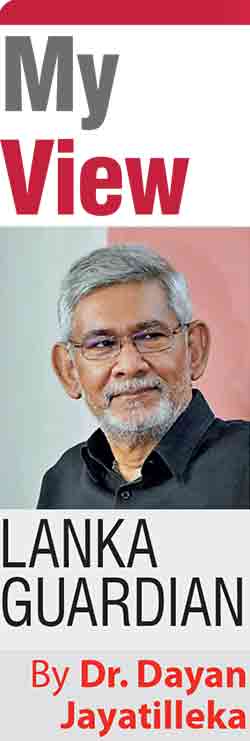 My late friend and comrade Kethesh Loganathan, son of a famous banker, a Georgetown alumnus, theoretician of the Marxist-led EPRLF, and finally, Deputy Head of the Peace Secretariat (SCOPP) who was assassinated by the LTTE when answering his doorbell, named his book ‘Lost Opportunities’, because that’s what he saw as the key motif of the Sri Lankan tragedy. I think of it as ‘Wrong Choices’ (or ‘turnings’) but there isn’t much difference—wrong choices/turnings result in lost opportunities.
My late friend and comrade Kethesh Loganathan, son of a famous banker, a Georgetown alumnus, theoretician of the Marxist-led EPRLF, and finally, Deputy Head of the Peace Secretariat (SCOPP) who was assassinated by the LTTE when answering his doorbell, named his book ‘Lost Opportunities’, because that’s what he saw as the key motif of the Sri Lankan tragedy. I think of it as ‘Wrong Choices’ (or ‘turnings’) but there isn’t much difference—wrong choices/turnings result in lost opportunities.
Sri Lanka is undergoing precisely such a moment. It is the third in the tenure of the AKD-led JVP-NPP administration. The first lost opportunity is in economics. The second, in diplomacy. The third, not quite lost yet, is in politics.
The lost economic opportunity was the chance to leverage the global coverage of the Aragalaya, international intellectual sympathy regarding Sri Lanka’s debt trap, the first ever Left government, and the counter-balance of multipolarity in world affairs (BRICS, SCO), to negotiate a better debt repayment deal. The criminal folly was not that of embarking on an IMF program as such but of continuing with this present IMF program without any effort at re-negotiation, and worse still, completely surrendering to the foreign private creditors.
I cannot help but smile wryly when I read ‘radical’ critiques of the IMF’s Sri Lanka policy which (rightly) condemn ‘Wickremesinghe-Rajapaksa’ but are so intellectually pusillanimous as to refrain from a single mention of AKD or the JVP-NPP, leaving an uninformed outsider to guess who wielded state power from Sept 2024. President Dissanayake chose to pass up the opportunity of engaging in tough yet skilful ‘trade union type’ negotiation with the IMF and private foreign creditors, thereby caging Sri Lanka, its people and his own administration within very narrow parameters.
The lost diplomatic opportunity was opting not to attend the BRICS and SCO summits.
The almost-lost political opportunity is that President AKD has chosen so far, not to use his two-thirds majority in Parliament to drill-through the obstacle blocking Provincial Council elections.
Litany of lost opportunities
President JR Jayewardene lost a similar opportunity with catastrophic consequences. His 1977 election Manifesto recognised and listed the specific grievances of the Tamil-speaking people and pledged to convene a Roundtable Conference to address them. He didn’t, despite or due to his 5/6ths parliamentary majority. He convened Roundtables in his second term (APC 1984, PPC ‘86)-- way too late.
Many administrations before and after Jayewardene’s committed the same blunder of delay in addressing the same question. SWRD Bandaranaike correctly tried to balance-off Sinhala Only with the Bandaranaike-Chelvanayakam Pact, but had he done so in the first flush of victory, on the heels of Sinhala Only (and reaching out to the Left) instead of waiting till the next year, his and the country’s tragic fate might’ve been averted.
President Chandrika Bandaranaike Kumaratunga squandered her entire first term and considerable political capital chasing the mirage of a new Constitution instead of implementing at least as a first step, either the 1957 B-C Pact or the 1987 13th amendment, not least in memory of her father and husband and as completion of their work.
President Mahinda Rajapaksa admirably held an election to the Eastern Provincial Council in wartime, shortly after evicting the LTTE in 2007. However, he missed the golden opportunity of electing the Northern Provincial Council soon after the military victory of 2009, because he was under pressure from his siblings, Basil and Gotabaya. Basil wanted rehabilitation, economic development and building the SLFP in the North before holding elections, and Gotabaya had been readily converted to the ‘abolish 13A/PCs’ extremist cause. By contrast President Putin held elections in Chechnya, on the eve of the successful final offensive to liberate Grozny -- a point I drew attention to at that time.
Mahinda’s realism obstructed
President Mahinda Rajapaksa was a centrist Realist who wanted to settle-up the wartime promises he had made to India, without which Tamil Nadu electoral pressure and lobbying from Delhi’s Western friends like Hillary Clinton could have made it impose a ceasefire on us before the war was won.
Having won the war, MR was consistent about his postwar political plan as revealed by Wikileaks. The cable sent on May 26th 2009 to Washington DC by the US Mission in Colombo on the May 20th 2009 farewell visit by Ambassador Robert Blake disclosed that:
‘…The President said the basis of his devolution plan would be the “13th amendment plus 1” - meaning implementation of the existing constitutional provisions for provincial councils, but adding an upper house to Parliament, modelled on the U.S. Senate…The President thought that giving police powers to the provinces, as the TNA and others were demanding, would cause problems. He said that responsibility for prosecuting and punishing serious crimes against society - he specifically mentioned murder and rape - should be handled by the Sri Lankan state. He noted that the incumbent Supreme Court Justice had already decentralized the court system. Ambassador asked whether one step to ensure devolution of power to the provinces would be to abolish the concurrent list of powers to be shared by the center and the provinces, instead giving the provinces primary responsibility. Rajapaksa replied that “we’ve been thinking about this but haven’t decided yet.”…’
Our May 2009 UNHRC Geneva victory had cleared space, bought time for postwar Sri Lanka in the global arena. By Dec 2009 the US Senate Foreign Relations Committee’s bipartisan Kerry-Lugar Report significantly entitled ‘SRI LANKA: RECHARTING U.S. STRATEGY AFTER THE WAR’, had parked accountability pragmatically on the back-burner and really required only devolution for the Tamils through implementing the 13th amendment. (https://www.foreign.senate.gov/imo/media/doc/SRI.pdf)
Mahinda Rajapksa was in Vietnam on the first ever state visit by a Sri Lankan Head of State when an advance copy of the Kerry-Lugar Report reached him. He had warmly insisted I accompany him to Vietnam. MR had the Report photocopied and distributed to his delegation. I was the first to be called in to brief him. When he went through the Report with me one-on-one over lunch, he had already spotted the ‘opening’ before I drew his attention to my annotation.
Had MR not been obstructed, Sri Lanka would have enjoyed Indo-US goodwill and economic support without having to sell-out on sovereignty or accountability. Mahinda Rajapaksa and the country’s postwar prospects were thwarted by the TNA’s devolutionary maximalism and his brothers’ devolutionary minimalism.
MR finally overrode the objections of his siblings and their respective supporters to hold the Northern PC election in 2013 though he knew the Govt would lose. But the propitious postwar moment had passed. Diaspora-driven and funded, Tamil politics had become radicalised again, as exemplified by Wigneswaran’s wastefully obstructionist chief ministership. Mahinda was weakened in relation to his anti-devolution siblings, by Tamil political non-reciprocity.
Lost decade: 2015-2025
The 2015 Yahapalanaya administration jammed-up the Provincial Council elections by throwing everything and the kitchen sink into the amendments of the election law. The Government’s UNP wing and its TNA ally were moving on a new Constitution that would go beyond the unitary framework and the 13th amendment, which was therefore felt to be dispensable.
The JVP-NPP’s filibuster is that there has to be extensive deliberation about what kind of electoral system is best for the holding of Provincial Council elections; if, after such deliberation, an improved system is identified, then it will be implemented using the Government’s 2/3rds majority; if not, the Government could—may--consider holding the election this one time on the old basis of unmodified proportional representation (PR). The timeline for the deliberation, who will participate in it, when the decision will be arrived at and when it will be implemented, remain unspecified.
President Dissanayake can use ITAK parliamentarian Shanakyan Rasamanikkam’s private member’s motion to hold the long-overdue PC elections on the previous basis just this once. But he has ignored this exit-ramp.
Devolution remains frozen, comatose, in suspended animation—if not dying. Even in wartime, presidents JRJ, Premadasa, Chandrika and Mahinda held Provincial Council elections.
Today, our democracy itself is truncated by the indefinite suspension of voting for the provincial middle tier of our state structure.
Antipathy to PCs
The objections to the Provincial Councils are irrational and often ignorant. One is the ‘white elephant’ argument of high cost and low economic benefit.
In the first place, that’s similar to complaining that one can’t digest with one’s lungs. The Provincial Councils weren’t primarily meant for economic purposes but rather as a solution to the quintessentially political ethnonational question. The Bandaranaike-Chelvanayakam Pact (1957) wasn’t economically motivated. Nor was SWRD’s advocacy of federalism in 1925-1926.
That said, even from an economic point of view, the developmental performance of the North-Western Provincial Council under the Chief Ministership of Gamini Jayawickrema Perera has been a stellar success and the subject of research studies in economic think-tanks.
The next objection is that of the Indian provenance of Provincial Councils. That could be considered a sincere argument if those who make it would also say that they would instead accept the totally homegrown Bandaranaike-Chelvanayakam Pact of 1957. But no critic of the Provincial Councils can be heard to support the B-C Pact.
The record also shows that the Political Parties Conference of June-July 1986, convened by President JR Jayewardene at the written exhortation of Vijaya Kumaratunga, and which featured as active participants major figures of the Sri Lankan left, Dr. Colvin R de Silva, Pieter Keuneman, Vijaya Kumaratunga, and Vasudeva Nanayakkara, produced a detailed blueprint for devolution to Provincial Councils (published as a booklet by the Government Printers). Endorsed by JR Jayewardene and the PPC, this had no Indian participants nor inputs.
Are opponents of externally-propelled Provincial devolution willing to accept the 1986 PPC framework of devolved Provincial Councils within a unitary state, co-drafted by Dr Colvin R de Silva who gave the 1972 Republican constitution an explicitly unitary definition (unlike the Soulbury model which was unitary in a de facto sense but not explicitly so)?
The refusal of the opponents of Provincial Councils to endorse either the Bandaranaike-Chelvanayakam Pact or the PPC consensus of Colvin-Pieter-Vijaya, neither of which had external patronage, reveals their real motivations.
The opponents of 13A/provincial devolution are of two sorts:
 Those who feel that the Provincial Councils devolve too little power because genuine devolution is impossible within a unitary framework and should be substituted by a federal system by whatever name.
Those who feel that the Provincial Councils devolve too little power because genuine devolution is impossible within a unitary framework and should be substituted by a federal system by whatever name.
 Those who feel that the Provincial Councils devolve too much power and should be shrunk back to District Councils.
Those who feel that the Provincial Councils devolve too much power and should be shrunk back to District Councils.
Those who regard the Provincial Councils as a mere antechamber or stepping stone to a separate state should listen attentively to the Tamil nationalists who never fully accepted the 13th amendment and existing Provincial Council system from 1987 to date, precisely because it provided no such opportunity.
Sinhala ultranationalists should also ask themselves the obvious question: why didn’t Prabhakaran and the LTTE accept 13A and the PC system, take the Chief Ministership and move towards separation, stealthily or by leaps and bounds? Because they knew it couldn’t be done. You can’t get to a separate state from provincial autonomy within a unitary state. Prabhakaran and the LTTE fought a war against India and murdered Rajiv Gandhi because 13A/provincial autonomy is an alternative to secession, a firewall against it.
Sinhala chauvinists should furnish evidence of autonomy within a unitary state (e.g., Philippines, China), resulting in separation or even in federalism.
At the opposite extreme, instead of working the 13th amendment and strengthening devolution, Tamil nationalist politics spurned an incremental-evolutionary approach, and finally lost the interest and involvement of India which has shifted to other priorities and partnerships with the center/Southern mainstream.
Instead of the Sinhalese leadership smartly capping Tamil demands and international pressure by acceptance and implementation of the 13th amendment, all three communities-- Sinhala, Tamil and Muslim-- now face an India which has been conceded by AKD a far bigger foothold than 13A would have.
Big questions
Six substantive questions arise:
 After a 30-year war originating in the North and East, what is the shape and content of postwar political reform necessary to stop a cycle?
After a 30-year war originating in the North and East, what is the shape and content of postwar political reform necessary to stop a cycle?
 With an influential Tamil Diaspora gathering electoral momentum, heroizing the Tigers, waving the Tamil Eelam banner and campaigning against Sri Lanka, what is the reformist political solution that can shield us?
With an influential Tamil Diaspora gathering electoral momentum, heroizing the Tigers, waving the Tamil Eelam banner and campaigning against Sri Lanka, what is the reformist political solution that can shield us?
 What is the durable political alternative for the Tamil people, apart from Tamil Eelam, merger with Tamil Nadu or unequal citizenship in Sri Lanka?
What is the durable political alternative for the Tamil people, apart from Tamil Eelam, merger with Tamil Nadu or unequal citizenship in Sri Lanka?
 Why do we need Provincial devolution?
Why do we need Provincial devolution?
 Why should it necessitate reactivating the 13th amendment?
Why should it necessitate reactivating the 13th amendment?
 Why is it urgently imperative?
Why is it urgently imperative?
We need provincial-level devolution because the reality of the island’s demographic composition and disposition is such that we must either have a level playing-field constitutionally, guaranteeing equality with no built-in privilege for any community (e.g., France, Singapore), or we must share power between the center and the provinces which contain non-majority constituent communities in compact near-contiguity.
This island is the only one in which the preponderant population speaks Sinhala and adheres to Buddhism. The State reflects that specificity through Constitutional privilege/’protectionism’. This hierarchy is an axiomatic reality of domestic geopolitics.
That leaves only one other means of accommodation of the uneven development of the demographic formation:
(a) A measure of territorial autonomy and self-administration within a unitary state
(b) Federalism.
Federalism on the doorstep of Tamil Nadu is correctly perceived as dangerously centrifugal, prone to osmosis and ‘Cyprusization’. This leaves territorial (provincial) autonomy within a unitary framework as the solution. The unitary character of the state is more than a red line; it is an axiom.
Why should the province rather than the district be the territorial unit of devolution? Because the collective Tamil identity and consciousness isn’t restricted to the district but falls short of a contiguous region, leaving the province the obvious midpoint. The Bandaranaike-Chelvanayakam Pact for ‘regional councils’ permitted districts to merge. As President JR Jayewardene told Mervyn de Silva in an interview carried in the Lanka Guardian magazine: “the Sinhalese say District Councils and no more; the Tamils say Regional Councils and no less. I say Provincial Councils.”
Systemic urgency
There is a systemic urgency for elections. By combining economic austerity with the continued closure of electoral safety-valves in the provincial middle-tier of the political system, the JVP-NPP is fuelling a backlash. From Nepal and Bangladesh through France to Madagascar to Peru, there is a chain-reaction of social explosions. Thanks to the JVP-NPP govt’s intemperate ultraliberal social lurches and the campaign of victimisation of wartime military brass (wait till the Independent Public Prosecutor’s Office gets going), the next backlash may contain ultranationalism unlike Aragalaya 2022.
A new radical Right ‘third party’ already exists. Sadly, the indispensable anti-racist Left, the FSP-PSA is too small to play Mélenchon’s France Unbowed. A snap Provincial Council election across the island is the only way to open the safety-valves and let out the steam. Massive voter participation will also marginalise Sinhala and Tamil ultranationalists.
[Dayan Jayatilleka was the youngest Minister in the Provincial Council system in 1988.]